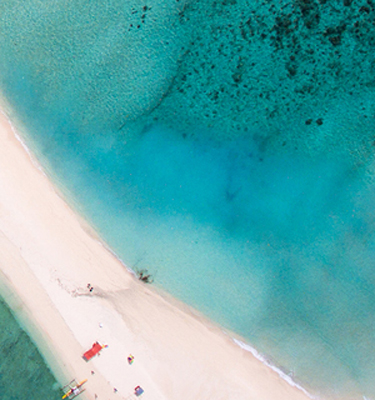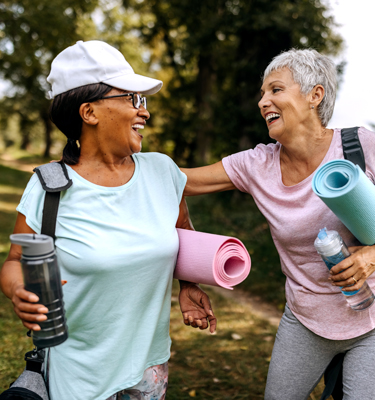How to boost your health during a stay-in-Canada summer vacation
July 24, 2025 | 6 min read
When Vancouver-based travel journalist Robin Esrock first visited Haida Gwaii, an archipelago off the coast of B.C., it was the kind of profoundly emotional experience that “makes life worth living.”
“Then I went up north and to the Prairies and realized there are so many incredible things to do in this country that you can’t do anywhere else,” he says.
Esrock has now spent more than a decade crisscrossing the country in search of unique experiences and authoring the bestseller The Great Canadian Bucket List.
More Canadians are thinking like Esrock this year. Airbnb, for example, saw online searches for domestic stays by Canadians grow nearly 20 per cent1 year-over-year in 2025. Meanwhile, domestic air passenger traffic was up 7.4 per cent in April compared to 2024, even surpassing 2019’s pre-pandemic levels by 1.5 per cent, according to Statistics Canada2.
“What we’re seeing overall is that Canadians are still travelling – especially during the summer months, which remain a peak time for vacations,” says Pamela Wong, head of travel insurance and general manager, Affinity at Manulife Canada, which manages the distribution of the company’s travel insurance products. “Canadians are making the most of their time off.”
There are plenty of reasons to feel great about a stay-in-Canada vacation. Experts say travel can significantly benefit mental health3 by reducing stress, reminding people of their passions, promoting personal growth and providing much-needed breaks from screens and daily routines. And thanks to Canada’s abundance of wide-open spaces, there are plenty of ways to boost your physical health too. This is all great news for the 74 per cent of Canadians4 who recently said they look to travel to help build resilience and manage stress.
To help make the most of your made-in-Canada vacation, we spoke to Dr. Jia Hu, a primary care and public health physician with Cleveland Clinic Canada, Manulife’s medical director, about the ways travel can build health and longevity, and asked Esrock to match that advice with some fantastic Canadian destinations.
Learn a new skill
Experiencing something new in a novel setting can improve your mood and reduce anxiety and stress, says Dr. Hu. “It may also improve our cognition and activate new parts of the brain.”
Try it here: Esrock recommends seeking out cooking classes – such as baking bannock5 at the Mi’kmaq Cultural Centre on Lennox Island, PEI or picking up archery skills at Painted Warriors6, an 82-acre ranch in the foothills of the Rockies.
Get moving, wherever you are
“Try to incorporate physical activity into your vacation, whether it’s a relaxing walk, swimming in a nearby body of water or going for a run,” says Dr. Hu. “Research7 has shown that just 10 minutes of moderate to vigorous daily exercise can significantly reduce the risk of mortality.”
Try it here: A day hike in the mountains of Waterton National Park8 in Alberta tops Esrock’s list. “It’s a destination that is completely underrated and is less touristy than Banff or Jasper,” he says. He also recommends cycling the historic Kettle Valley Railway Trail9 in B.C.’s beautiful – and mainly flat – Okanagan Valley.
Bonus tip: If you’re planning a trip outside of your home province, one thing to pack for added peace of mind is travel insurance. The misconception that travel insurance isn’t needed for domestic travel can be costly, says Wong. While provincial plans cover costs associated with public hospital visits, they don’t cover things like prescription drugs, lab tests or diagnostics outside of an emergency room visit.
Related: Discover how CoverMe travel insurance can make your trip even more relaxing
Check out Manulife’s wide range of coverage options to best suit your travel protection needs.

Bathe yourself in nature
From forest bathing to beachcombing, being in natural surroundings helps improve mood, reduce anxiety, lower blood pressure and boost the immune system, says Dr. Hu. “Green or blue spaces contribute to our overall well-being by reducing stress, and can even improve memory, confidence and self-esteem,” he says. “Taking regular nature walks can reduce the symptoms of depression or anxiety by about 20 per cent10.”
Try it here: Esrock likes to seek out green space on all of his travels, even if he’s city bound. He suggests urban parkland like Vancouver’s Pacific Spirit Regional Park11, Toronto’s High Park12 or Montreal’s Mount Royal Park13. For a more immersive experience, he recommends the East Coast Trail in Newfoundland, a section of the Trans Canada Trail14 that begins at Cape Spear, kilometre 0 of the entire 28,000-kilometre trail. The Avalon Peninsula route is one of Esrock’s favourites, offering gorgeous scenic views and hikes along cliffs, with views of migrating whales often breaching just offshore.
Make your connections (the human kind)
Travel offers opportunities to make social connections with others, which is a significant predictor of mental and physical health and longevity, says Dr. Hu. “Good social connections can decrease levels of stress hormones, like cortisol,” he says.
Try it here: Even when travelling solo, Esrock often books group activities and loves the ritual of swapping stories at the end of the day. He recommends a multiday horse-riding15 trip through the backcountry of Banff National Park in Alberta. “There’s plenty of time to talk while you’re riding or sitting around a campfire,” he says.
Keep learning: Why prevention matters
Experts explain why adopting healthier habits – even small ones – is an investment in your future physical and mental health.

Cut the cord
It can be tempting to spend a chunk of every vacation snapping pictures and sharing them online. But reducing time on social media during your vacation can decrease stress and enhance mindfulness, says Dr. Hu. “Excess social media usage can contribute to feelings of dissatisfaction and isolation and worsen symptoms of depression and anxiety.”
Try it here: If you want to remove all temptation, Esrock suggests heading to remote destinations without smart phone service, like areas of Algonquin Park16 in Ontario, or, if you’re really looking to go the distance, Arctic Watch Wilderness Lodge17 on Somerset Island, Nunavut – the world’s most northerly eco-lodge, about 800 kilometres north of the Arctic Circle.
These kinds of activities show how easy it can be to build healthy behaviours into your day-to-day. “Even on vacation, simple is often best – get outside, move your body or connect with others,” says Dr. Hu. “Whether you’re close to home or exploring new places, building small, meaningful health moments into your day can have a lasting impact.”
This story was originally published in The Globe and Mail on June 26, 2025.
This article is for informational purposes only. It is not intended to diagnose or treat a condition. If you have questions or concerns about your specific situation or are seeking medical advice, contact your medical doctor or your health-care provider.
In alignment with its Impact Agenda, Manulife is proud to support the Trans Canada Trail’s Accessibility Mapping Program.
Cleveland Clinic Canada
Manulife is proud to have Cleveland Clinic Canada on board as Medical Director for our Group Benefits operations. Cleveland Clinic Canada has a wealth of global healthcare expertise and shares our goal to help Canadians live longer, healthier, and better lives. Cleveland Clinic is a nonprofit organization that has been at the forefront of modern medicine since 1921. In recent years, Cleveland Clinic has worked with progressive companies in Canada and around the world to prioritize the health and well-being of their employees, customers, and communities.